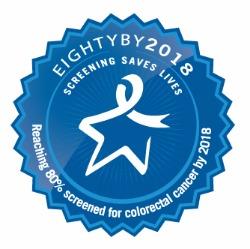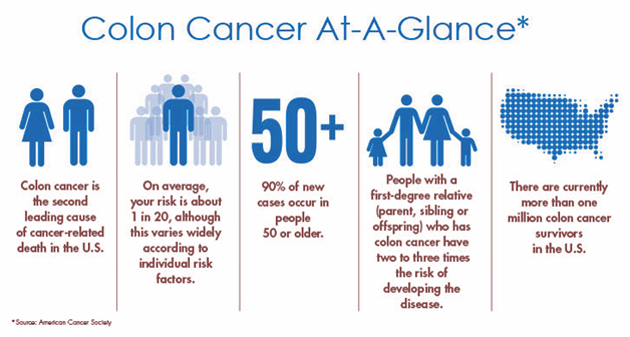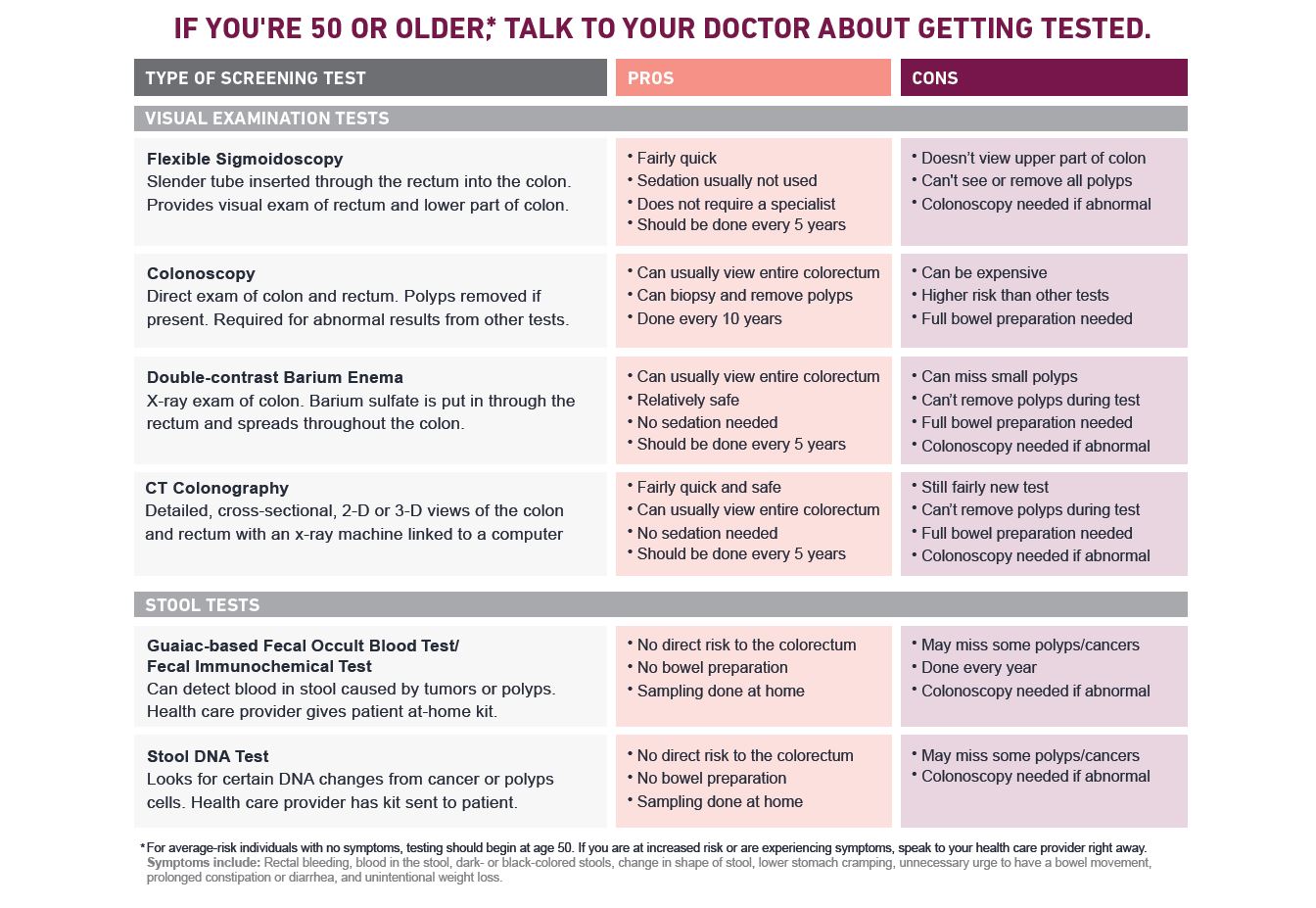True or False?
Colorectal cancer is the 2nd leading cancer killer.
TRUE
Both men and women get colorectal cancer.
TRUE
Colorectal cancer often starts with no symptoms.
TRUE
Screening helps prevent colorectal cancer.
TRUE
Colorectal cancer is cancer that starts in the colon or rectum. Thanks to screening, early detection, and many treatment options, there are over a million colorectal cancer survivors in the United States today.
How common is colorectal cancer?
Excluding skin cancers, colorectal cancer is the third most common cancer diagnosed in both men and women in the United States. The American Cancer Society’s estimates for the number of colorectal cancer cases in the United States for 2017 are:
- 95,520 new cases of colon cancer
- 39,910 new cases of rectal cancer
Overall, the lifetime risk of developing colorectal cancer is: about 1 in 21 (4.7%) for men and 1 in 23 (4.4%) for women. This risk is slightly lower in women than in men. A number of other factors (described in Colorectal cancer risk factors) can also affect your risk for developing colorectal cancer.
Colorectal cancer risk factors you can change
Several lifestyle-related factors have been linked to colorectal cancer. In fact, the links between diet, weight, and exercise and colorectal cancer risk are some of the strongest for any type of cancer.
Being overweight or obese
If you are overweight or obese (very overweight), your risk of developing and dying from colorectal cancer is higher. Being overweight raises the risk of colon cancer in both men and women, but the link seems to be stronger in men.
Physical inactivity
If you are not physically active, you have a greater chance of developing colorectal cancer. Being more active might help lower your risk.
Certain types of diets
A diet that is high in red meats (such as beef, pork, lamb, or liver) and processed meats (such as hot dogs and some luncheon meats) can raise your colorectal cancer risk.
Cooking meats at very high temperatures (frying, broiling, or grilling) creates chemicals that might raise your cancer risk, but it’s not clear how much this might increase your colorectal cancer risk.
Diets high in vegetables, fruits, and whole grains have been linked with a lower risk of colorectal cancer, but fiber supplements have not been shown to help.
It’s not clear if other dietary components (for example, certain types of fats) affect colorectal cancer risk.
Smoking
People who have smoked for a long time are more likely than non-smokers to develop and die from colorectal cancer. Smoking is a well-known cause of lung cancer, but it is also linked to other cancers, like colorectal cancer. If you smoke and want to know more about quitting, see Guide to Quitting Smoking.
Heavy alcohol use
Colorectal cancer has been linked to heavy alcohol use. Limiting alcohol use to no more than 2 drinks a day for men and 1 drink a day for women could have many health benefits, including a lower risk of colorectal cancer.
Screening and Early Detection
The death rate (the number of deaths per 100,000 people per year) of colorectal cancer has been dropping for several decades. One reason for this is that today, colorectal polyps are more often found by screening and removed before they can develop into cancers.
It can take as many as 10 to 15 years for a polyp to develop into colorectal cancer. Regular screening can prevent many cases of colorectal cancer altogether by finding and removing certain types of polyps before they have the chance to turn into cancer. Screening can also help find colorectal cancer early, when it’s small, hasn’t spread, and is easier to treat.
When colorectal cancer is found at an early stage before it has spread, the 5-year relative survival rate is about 90%. But only about 4 out of 10 colorectal cancers are found at this early stage. When cancer has spread outside the colon or rectum, survival rates are lower.
Unfortunately, only a little more than half of people who should get tested for colorectal cancer get the tests that they should. This may be due to things like lack of public and health care provider awareness of screening options, costs, and health insurance coverage issues.
The NJCEED Program offers free cancer screenings for uninsured individuals
Call today to see if you are eligible!
Cumberland/Salem Counties: (856) 641-8686
Gloucester County: (856) 508-3516
See “ Colorectal cancer screening tests” for more on the tests used to screen for colorectal cancer.
Everyone ages 50-75 should be screened for colorectal cancer. Many screening options are available. Visit https://www.cdc.gov/cancer/colorectal/basic_info/screening/tests.htm for a list of testing options.
Information from the American Cancer Society (www.cancer.org) and the Centers for Disease Control and Prevention (www.cdc.gov/cancer)



